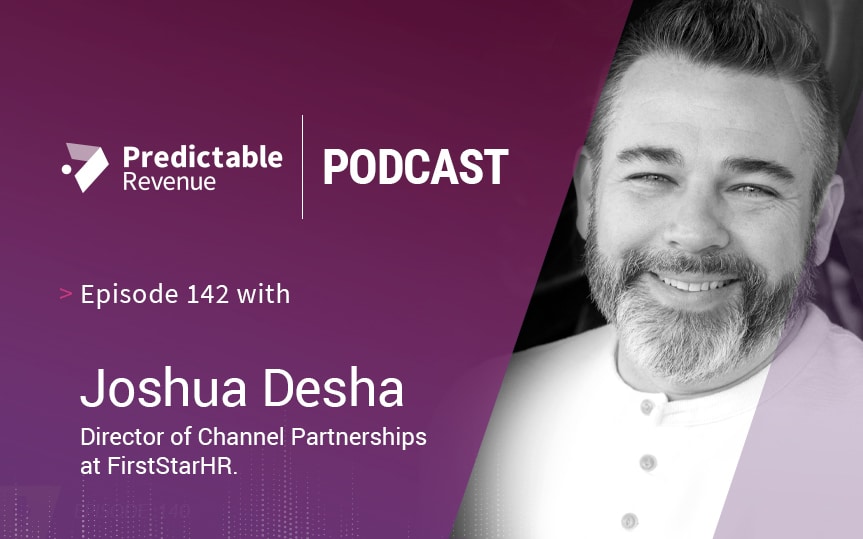The Rise of the Anti-Metrics Sales Leader

Metrics have become a pillar of modern sales. From interviews, to meetings, to ones day-to-day executional tasks – metrics, in one way or another, have become a part of them all.
And, at least on paper, that evolution has made sense: why wouldn’t we, as salespeople and company leaders, make decisions and base our planning on numbers? Why not let data drive our plans?
Well, not everyone sees it exactly that way. According to Joshua Desha, a veteran entrepreneur and insurance sales leader, a metrics-driven approach to sales has actually robbed the professional of its heart and soul.
“It’s interesting, We are all taught, from the beginning, that trust is the reason people buy. Yet we are also told that we need to turn into robots and reach out to hundreds of people, trying to get them to say yes to a meeting. It’s all about volume,” says Joshua Desha, on a recent edition of The Predictable Revenue Podcast.
But, trust and volume don’t work together – these things don’t align. Is it any wonder because of that that fewer people want to be in sales? Sales used to be noble. Sales is an industry where people can make tons of money, but it is now the 3rd, 4th, 5th choice for people in their careers. I believe metrics are at the root of this.
Promoting bad sales behaviour
So, why is volume such a bad thing? Surely, if you reach out to more people you increase your chances of generating opportunities, right?
Not quite, says Desha. It is true that the more area you cover, the more conversations you will have. But, leaning on numbers versus getting to know your prospects and your community is, in the long run, more important. And a dependency on activities – your daily touchpoints, if you will – actually hinders one’s ability to build trust, rapport, and connection.
“Salespeople, too often, don’t have to think about how to treat a prospect, it’s, again, all about volume. This is what metris teaches you. That creates a lack of emphasis on taking care of a person,” says Desha.
“Instead of volume-based selling, it should be value-based selling. Metrics takes it away from value – over and over again.”
The dehumanization of the sales process is furthered by companies not investing in the sales process or, by extension, their salespeople. For example, the compensation structures for salespeople are often heavily based on commision (uncapped commission in many respects).
And what is at the core of uncapped commission? Again, activities, or metrics.
“We make salespeople jump through hoops, and complete assessments. Then, we hire them and pay them $2,000 a month. All of that potential only exists if they hit their quotas. It isn’t honest. We would never treat a Head of HR like that, or a Head of Marketing like that,” says Desha.
Why is that a salesperson is told that we can only pay $2,000 per month and unlimited potential? Because we know they are going to call 50 people per day, and we have a closing ratio of X. From there, a company knows what they can bring in. The vast majority of people don’t hit the OTE that is outlined.
Let’s not forget about the element of luck involved in selling, too. If you have a better territory or better accounts, you’re going to crush it. That, of course, doesn’t mean you are a better salesperson. But, the salesperson with the less attractive territory is only going to have up their activity levels to keep up.
(Editor’s note: we chatted with Zendesk’s Jamie Buss recently about how to transform salespeople into leaders. You can read about our chat here, or listen to the entire in-depth interview here)
How do we humanize running our sales teams?
So, how do we get away from that dependency on metrics? How do we, as an industry, foster a culture of value instead of volume?
It starts, says Desha, with offering your salespeople a realistic compensation package.
“Pay salespeople as though you value their contribution.If it’s all commission, or heavy commission, you are telling them they are a dime a dozen, and you don’t value them. Shift your mindset from volume to value,” says Desha.
That will promote a system of not just talking to as many people as you can. Instead ask, ‘who do I need to talk to? What research do I need to do? That, in turn, will help you create great relationships with them.
Think of it this way: if you need a closing ratio of 18-20%, you could have 50 great calls that will create 20 actual conversations. Those 20 conversations will create 10 appointments, and from there 1 – 2 will close.
Or, says Desha, you could “research the hell” out of 10 people, get to know them, and close 2 of those calls. As such, the 18-20% closing ratio stays in tact.
“A happy salesperson who will be energized and probably go out and try to do 20 of those calls,” says Desha.
And they will ask: ‘what can I do in the community today?’ instead of ‘how many people do I call today?’ That is how you fix it.
From a management perspective, falling back on metrics shows a lack of knowledge and trust. If you’re doing proper call reviews, coaching, the netrics at the end of the day, don’t tell the whole story. You really need to understand sales, and what reps need to work on, so they can close what they need to close.
How do you balance time crunches and goals with giving salespeople that space?
Of course, companies need to grow. Maybe you’ve taken on investment money and growth is a requirement from the board – that is real pressure.
But, again, a value-based approach can support growth, says Desha. This is absolutely not an either-or scenario.
“Having a values based system doesn’t mean there are no goals. In metrics based selling, you are valuing the touch. In a value-based scenario, you are valuing what comes from those calls or engagements,” says Desha.
So, if you are my salesperson, I’m going to ask you how you feel you can get to your goals.
For more on Desha’s thoughts on value-based selling – including his philosophy on the role of managers in such a system – check out the rest of his interview on The Predictable Revenue Podcast
NO TIME TO READ?
Listen On:


